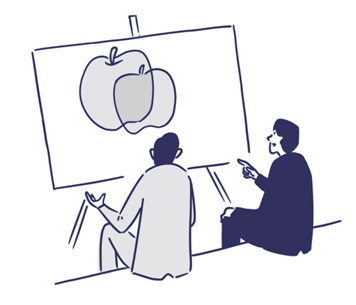A Coaching Model By Potsakorn Srisophon, Business Coach, THAILAND
Every Advancement in Life Requires a Lot Of EFFORT
During the past few years, people are struggling with the fast-changing environment in the world. Everyone from individuals to the nation-state level needs to be ready for the uncertainties in the future. Before my previous superior got a career promotion, she brought me a glass that says “EFFORT” and she mentioned that it is a key development for leaders I also agreed with her that every advancement in life requires a lot of “EFFORT” in it. For this reason, I would like to select this word as my coaching model.
EFFORT Coaching Model Influence
If we were to ask people who succeed in life about their tips for being successful, some may say that it is from their effort. Many people try to work as hard as they can while others are giving more importance to how to work smart. Both groups require the same mindset which is “to put the effort in what they do”. This coaching model is based on the effort that the coach should be aware of in order to partner with the client for desirable achievement.

E-Equal
Equal is one of the most important factors in coaching where both coach and client share an equal stance. The coach provides questions toward the goal, achievement, and vision of a client to expand and explore their views including re-interpret their beliefs. However, the coaching method does not divide into “instructor” and “learner”, it requires both parties to be in an equal stance with creating dialogue towards the goal. In coaching, the coach will not give answers. Clients will think and choose their own actions. It is a process that allows both coach and client to develop their skills and abilities on their own.
F-Feedback
Feedback is crucial for achieving and growing the client’s goal. It can also provide a huge impact on team performance and organizational performance. Feedback is not a unilateral action but it should be done together by both coach and client. Not just one side will always be the only feedback provider but exchanging feedback from each other will increase self-awareness and accountability on both sides.
F-Fun (challenging new things)
Creating a fun environment will elevate the learning process of both coach and client. If a coach can create an atmosphere where clients can enjoy the coaching sessions, it will also increase the accountability of the client to take action regarding what they have said during the session. Having fun in the session does not mean making jokes, but it is more about engaging both client and coach to be thinking partners together.
O-Ongoing
An important part of coaching is to take action from what the client has been aware of during the coaching session. Creating strategy and measure for actions to close the gap between ideal situation require an ongoing process. Therefore, coaching should carry out ongoing actions and practice during each session so that the client can reflect on and correct that behavior to achieve their desired goal.
R-Re-define
In coaching, the interaction of the coach with the client is like sitting in a chair next to each other and painting on a blank canvas together. A coach helps the client to redefine the meaning and verbalize what is in the client’s mind. Re-defining the meaning of a group of words or sentences will help clients see a clearer image of what they are thinking including the being themselves. During this process, powerful questions such as “what do you mean by saying…” and “Would you tell me more about…” can help clients explore and somehow shift their focus point.

T-Tailor-made
Each person holds different values, working methods, perspectives, interpretations, etc. A coach cannot use a single principle or skillset to deal with all clients since there is no such successful formula that can be used. Coaches need to tailor-make their ways of coaching their clients to achieve the desired outcome.
Learn How to Create Your Own Coaching Model
Your Coaching Model reflects your values,
philosophies, and beliefs and must communicate who you will coach
and the problems you will solve. Read more about creating your coaching model
References
Six Habits of Highly Empathic People. Roman Krznaric. November 27, 2012.
The Coaching Feedback Model. Carol Wilson. 2017.